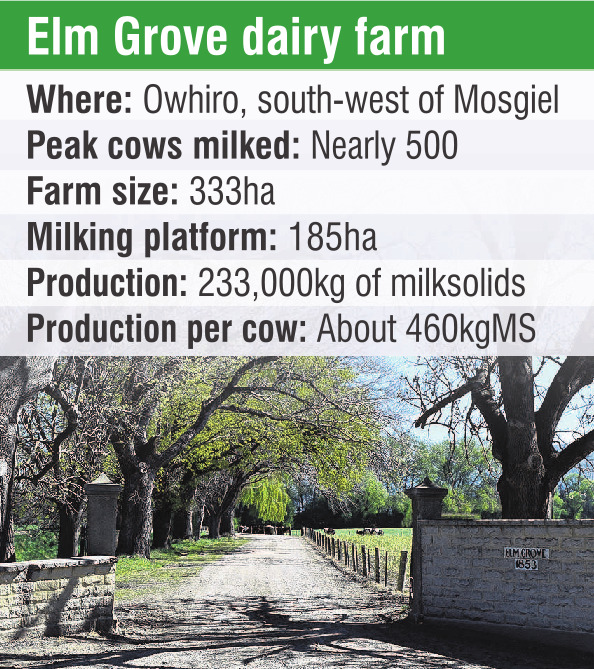
Sharemilkers Will and Sarah Kirkland launched their skincare business Elm Lab from their family farm Elm Grove near Mosgiel late last month.
The couple met after their university years, she was the daughter of sheep and beef farmers in Manawatu and he was the son of dairy farmers on Elm Grove.
He studied a Bachelor of Commerce in Agriculture at Lincoln University and she studied law at the University of Otago.
After seven years working in New Plymouth, she as a lawyer and he as a rural bank manager, they decided to move to Elm Grove about three years ago to raise their growing family.
When they arrived at Elm Grove, their second child Charlie was a baby and had the skin condition eczema, unknowingly providing the catalyst for Elm Lab.
Mrs Kirkland recalled being a "tired and stressed mum" seeking something to apply to her son’s skin.
"I thought, what can I put on this which will be gentle and effective because everything aggravated it somehow."
A nurse suggested she apply the colostrum from her breast milk but she did not have any available.
When she returned to the farm upset, her husband suggested using cows’ colostrum.
"That’s how the whole thing started."
The Kirklands harvest A2 colostrum from their DNA-tested cows and transform the "liquid gold" into skincare products that have been tested by dermatologists and paediatricians.
Their cows’ colostrum was frozen after harvest at Elm Grove, transported to Christchurch to be freeze dried and then transported to Blenheim to be made into a skincare range.
The product range includes a baby wash, a baby lotion and a hand cream for mums, available exclusively online.
Elm Lab helped her deal with her son’s skin issues and be part of the proud business history of Elm Grove.
A bit of blind faith was needed to establish a skincare business, Mrs Kirkland said.
Mr Kirkland agreed.
"We thought bugger the boxing, pour the concrete anyway."
A belief in their product and it being the next big thing in the skincare industry kept them going, she said.

"We muddled our way through and it has been really hard but worth it."
Their career skill sets had complemented each other, Mrs Kirkland said.
"We couldn’t have done it without each other."
She had plans to expand the range to include a moisturiser and eczema balm for children.
Other future plans included targeting international markets.
After creating the product, they did some market research which showed a demand for colostrum-based skincare in New York.
Some business advice from a potential manufacturer of the skincare range was to include just a small amount of colostrum to reduce production costs, she said.
"That didn’t sit right with us. We wanted as much colostrum as we possibly can."
The hand cream and baby lotion was 70% colostrum and the baby wash was 62% colostrum.
"We whole heartedly believe in colostrum and that’s why we didn’t want to bring it down to pixie dust levels."
Mr Kirkland agreed, he wanted Elm Lab skincare to be more about substance rather than sparkle.
Business had been a steady wave of sales since the business went live.
"Launch day was crazy, our phone just blew up."
Mrs Kirkland said another motivation for launching the business was to show her children the fruits of her efforts.
"I want them to see they can do anything if they work hard and try their best and what can be achieved on no sleep."
Mr Kirkland’s great-great-great-great-grandfather John Kirkland, a Scottish ploughman, sailed towards New Zealand with his wife Margaret, son William, 2, and daughter Agnes, 5 months.
On board, Margaret died from cholera and Agnes died a week later.
After John arrived in Mosgiel with little capital, he left William under the care of a widower to go goldmining in Australia.

The development of Elm Grove included buying more land and steam engines to plough and provide power and heated water to a butter and cheese factory established on the farm in the late 1860s.
William continued introducing innovations including installing mechanical milking at Elm Grove, a first in New Zealand in 1901.
Dairy cows had always featured on Elm Grove.
When his grandfather David was in charge the livestock on Elm Grove was a third dairy cattle, a third sheep and a third beef cattle.
Mr Kirkland’s father Allan preferred working with dairy cows than sheep and beef.
When the cows were making half of the income, he negotiated with his father to convert all of the farm to dairy in 1985.
His father introduced bulls with A2 genetics about 20 years ago.
The farm conversion included installing a 50-bail rotary milking shed, Mr Kirkland said.
"It’s still going and still original. It was big back in the day. I’d like a new one but it’s too good to justify getting a new one."
Cows were milked twice a day and the frequency shifted to every 16 hours in late summer.
They had started using beef semen across the bottom cut of cows to add some value to their calves.
The latest farm expansion was the recent purchase of a 22ha neighbouring block.
"It is probably going to be a beef block to rear more calves and reduce our bobbies."
All livestock on Elm Grove ate only feed grown on the farm.
"It is a low-cost system we’ve always run and quite like."
Mr Kirkland said every generation of his family had introduced their own innovation to Elm Grove and his included the skincare range.
"It continues what the rest of the generations have done," he said.













